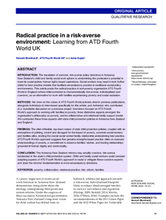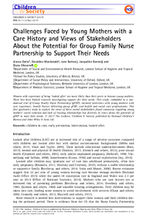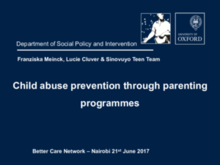Displaying 471 - 480 of 947
This report examines and shares learnings from ATD Fourth World UK's social work practice framework with families experiencing poverty, discussing its strengths-based collaborative approach to build relationships and reduce power imbalances between practitioners and families. Implications for the feasibility of implementing this framework in child protection social work practice and policy in Aotearoa New Zealand is also addressed.
This study observes foster care re-entry for young people whose families participated in Cottage Housing Incorporated's Serna Village Program (CHI), a supportive housing program serving homeless families in Sacramento, California.
This study measured the effectiveness of a Positive Parenting and Sensitive Discipline program for mothers and their 10- to 36-month-old children placed in parental residential care.
This qualitative study, embedded in a randomised trial of the Group Family Nurse Partnership (gFNP) program, was designed to explore the challenges faced by women with experience in the care system during pregnancy and early parenthood and to assess the potential of gFNP to meet their needs through the perspectives of a range of informants.
The 2017 Home Visiting Yearbook presents, for the first time, the most comprehensive picture available of home visiting on the national and state levels, revealing the breadth of home visiting in the United States and identifying the gaps in practice.
In this video message, Marta Santos Pais, SRSG on Violence against Children, addresses the June 2017 Africa Expert Consultation on Violence against Children (VAC) in All Care Settings.
This presentation describes the process, key findings, and recommendations from the Sinovuyo Teen Study, a project of the World Health Organisation's Parenting for Lifelong Health.
This article examines the impact of poverty on looked-after children and their families, describes and evaluates the use of multiple family group therapy and other family-based interventions, and reports children's experiences and feedback from the groups.
In this article, researchers summarize what is known about engaging fathers in parenting programs, then argue that programs are most effective when coparenting is the focus early in family formation.
Produced by MenCare, the second State of the World's Fathers report provides a worldwide analysis of fatherhood and caregiving. Drawing on global research and statistics, this report serves as an advocacy tool for MenCare's global fatherhood campaign and proposes a call to action for policy and practice around the world.





